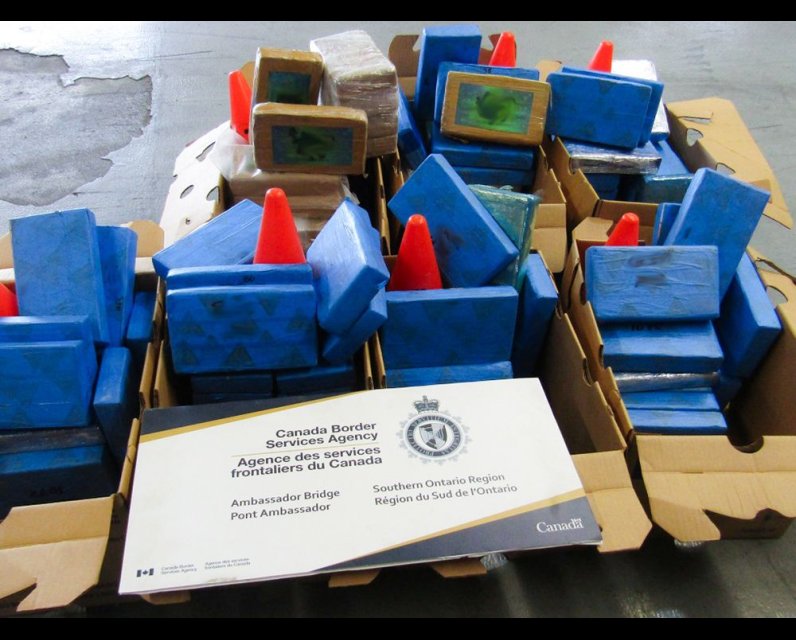Source Feed: National Post
Author: Adrian Humphreys
Publication Date: June 10, 2025 - 16:39
Almost $50 million in cocaine found hidden in trucks crossing into Canada from U.S., police say
June 10, 2025

A cross-border drug smuggling network using commercial truck drivers to haul large loads of cocaine across the border from the United States into Canada has been revealed by police in southern Ontario, leading to the arrest of nine men and the seizure of 479 kilograms of bulk cocaine bricks.
Of the nine arrested, six have since been released on bail while three are still awaiting bail hearings after what Peel Regional Police described Tuesday as the largest drug bust in the police service’s history.
Investigators gave the cocaine an estimated retail street value (based on a per-gram level) of $47.9 million.
More than a third of the cocaine was caught at the border, reflecting a significant trend in the flow of drugs: from Mexico into the United States and then smuggled into Canada hidden aboard commercial transport trucks.
The importations were destined for Peel Region, located to the west and northwest of Toronto and encompassing the cities of Mississauga and Brampton and the town of Caledon. It is a large commercial trucking and distribution point, and home to the Toronto Pearson International Airport.
“Here in Peel, we have the largest logistics hub outside of Los Angeles, and what that means is that vulnerabilities in logistic systems can be exploited by criminal networks to their advantage,” said Peel’s Chief of Police Nishan Duraiappah.
The Peel probe, in collaboration with other Canadian and American agencies, identified commercial trucking companies and storage facilities connected to the smuggling operation, he said.
“This represents a seismic blow to transnational organized crime … these drugs came from south of the border and were destined right here in Peel and the greater Toronto area and other communities in Canada. And what they do is represent secondary and tertiary criminal acts, vulnerabilities and harm that damage our communities right across Ontario and beyond.”
The arrests and seizures, called Project Pelican, follow
recent similar arrests
, indictments and seizures in the United States of several American, Canadian and Mexican citizens who were using commercial transport trucks to
smuggle tonnes of cocaine
into Ontario and Montreal. The U.S. cases linked Los Angeles to Brampton through trucking operations.
Project Pelican began a year ago when investigators with Peel police’s Specialized Enforcement Bureau learned of an organized criminal network smuggling drugs into Peel region, Duraiappah said.
Det.-Sgt. Earl Scott, case manager for Project Pelican, said the importations were “a well-organized criminal enterprise.”
Peel investigators worked with Canada Border Services Agency (CBSA) officers to stop and search two specific trucks crossing into Canada.
On Feb. 11, border agents at Ambassador Bridge crossing in Windsor sent a tractor trailer arriving in Canada for a secondary examination based on intelligence developed during the probe, said Abid Morgan, CBSA’s director of intelligence and enforcement for the Southern Ontario region. CBSA officers, aided by a drug sniffing detector dog, found 110 bricks of suspected cocaine that weighed 127 kg. One person was arrested and charged.
On May 24, border agents at the Bluewater Bridge border crossing in Sarnia sent an arriving tractor trailer for a secondary examination, again based on intelligence developed during the investigation. CBSA officers used a detector dog and a large-scale imaging truck and found 57 kg of suspected cocaine, CBSA said. One person was arrested and charged.
“This is a significant quantity of drugs that will never make it into our communities,” Morgan said.
The suspected cocaine was found hidden in the trailers of two tractor trailer trucks.
In addition to the two border stops and arrests, a series of coordinated search warrants and arrests took place around Peel region and in Toronto, involving more than 60 officers.
Two of those arrested in the probe were in possession of loaded guns, Scott said. The men arrested had no, or very little, known criminal background, he said.
The investigation continues, police said.
Peel’s Deputy Chief Nick Milinovich said the problem is acute.
“This is connected to a trend that we’re seeing,” he said. “And without commenting specifically on this investigation that trend is illegal drugs coming from Mexico through the U.S. using logistics companies to bring them to Canada. And not specific to this investigation, we’re aware of the trends. We’re seeing more illegal drugs than we have before.”
Milinovich said the amount of drugs seized was important enough, but the operation becomes impressive because of how difficult such transnational investigations can be.
“When you consider that with the complexity of the way crime has evolved today, the face of crime, it’s no longer a person within your jurisdiction that’s responsible for it, it’s transnational crime with complexity and barriers attached to it,” Milinovich said.
“Every gram every kilogram that we stop from coming to our community saves lives. Every firearm, illegal firearm, that we seize off the street saves lives.”
The investigation also involved the RCMP, U.S. Department of Homeland Security, the U.S. Drug Enforcement Administration, and the Criminal Intelligence Service Ontario.
• Email: ahumphreys@postmedia.com | Twitter: AD_Humphreys
Our website is the place for the latest breaking news, exclusive scoops, longreads and provocative commentary. Please bookmark nationalpost.com and sign up for our daily newsletter, Posted, here.
The Canadian Security Intelligence Service confirmed it had sent an 'espionage advisory' to federal departments and universities.
July 5, 2025 - 05:00 | Stewart Bell | Global News - Canada
Annika Bell is raising money for organizations that support women who have experienced sexual assault or are fleeing situations involving intimate partner violence.
July 5, 2025 - 05:00 | Ella Macdonald | Global News - Canada
A longtime resident of the Airport Inn outside Fredericton says she wants the landlord to face repercussions for how the situation unfolded.
July 5, 2025 - 05:00 | Anna Mandin | Global News - Canada




Comments
Be the first to comment